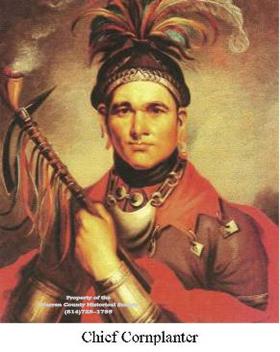Chief Cornplanter
Cornplanter, who was also known as John Abeel or O’Bail, was born in about 1750 in a Seneca community near what is now  Avon, New York. Cornplanter’s mother was an important Seneca woman of the Wolf Clan and his father was a trader from Albany, New York. Although he was half-white, Cornplanter’s mother and relatives raised him as a Seneca, and he eventually became a chief through his own skill and his mother’s clan connections.
Avon, New York. Cornplanter’s mother was an important Seneca woman of the Wolf Clan and his father was a trader from Albany, New York. Although he was half-white, Cornplanter’s mother and relatives raised him as a Seneca, and he eventually became a chief through his own skill and his mother’s clan connections.
During the Revolutionary War, the Seneca Indians at first did not take sides with either the English or the Revolutionary forces. Eventually, however, the Seneca chose to side with the English. Cornplanter proved himself a strong and important warrior and leader of the Seneca during the Revolutionary War.
With the loss of the war by the British, the Seneca found themselves abandoned and facing a hostile new nation, the United States. Instead of continuing to physically fight against encroachments on their land, Cornplanter chose to cooperate with the United States.
Although much Seneca land was eventually taken over by the new nation, Cornplanter personally received a grant of land in Warren County from the state of Pennsylvania. This land, called the Cornplanter Tract, became Cornplanter’s home in his later years.
Cornplanter died on his land in 1836. His descendants inherited the land. Unfortunately, in 1964, with the building of the Kinzua Dam, many communities were flooded, including the Cornplanter Grant. Cornplanter’s descendants, like many other people, were forced to move to new homes and abandon their land.
Courtesy of the Warren County Historical Society
 Avon, New York. Cornplanter’s mother was an important Seneca woman of the Wolf Clan and his father was a trader from Albany, New York. Although he was half-white, Cornplanter’s mother and relatives raised him as a Seneca, and he eventually became a chief through his own skill and his mother’s clan connections.
Avon, New York. Cornplanter’s mother was an important Seneca woman of the Wolf Clan and his father was a trader from Albany, New York. Although he was half-white, Cornplanter’s mother and relatives raised him as a Seneca, and he eventually became a chief through his own skill and his mother’s clan connections.